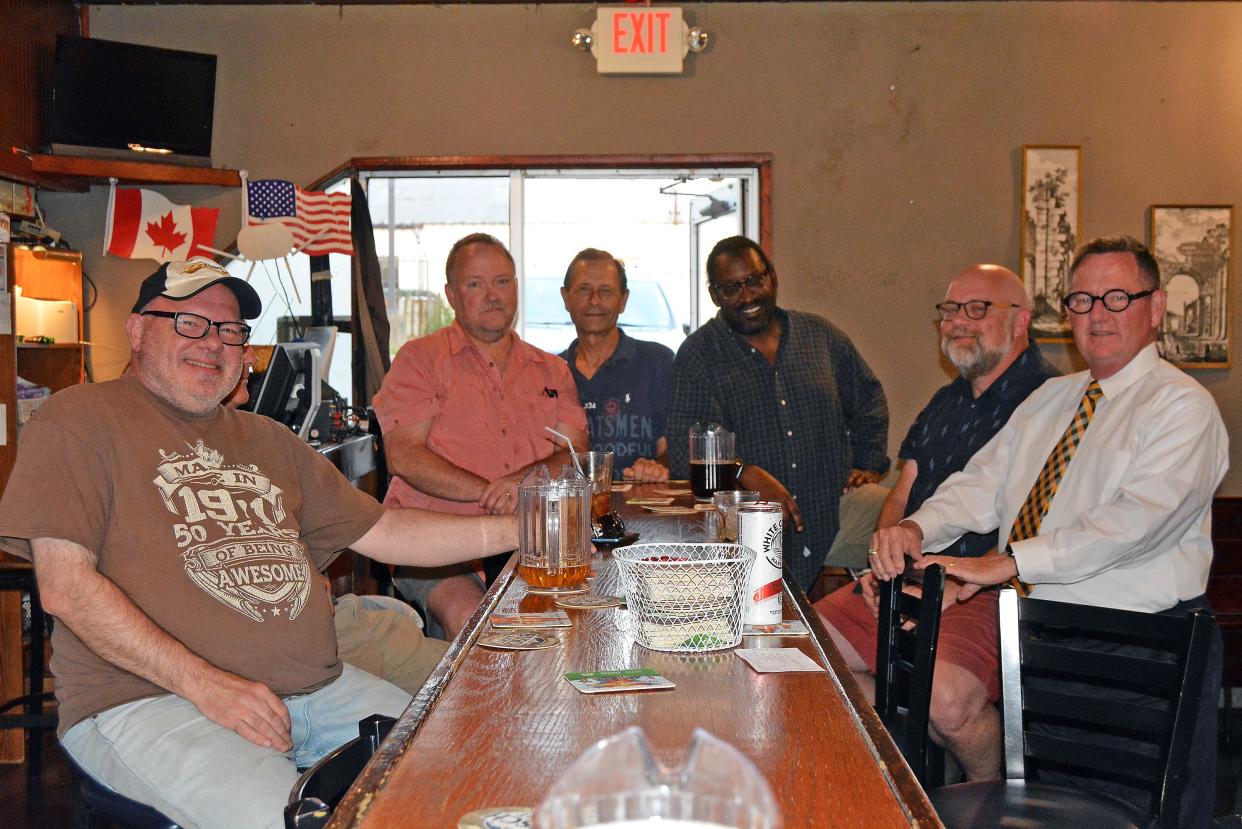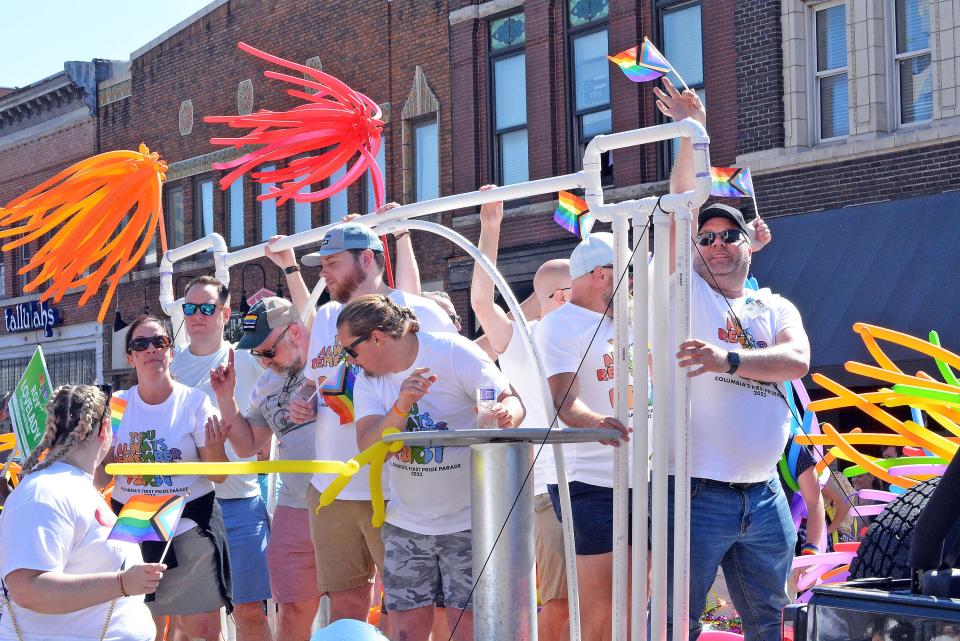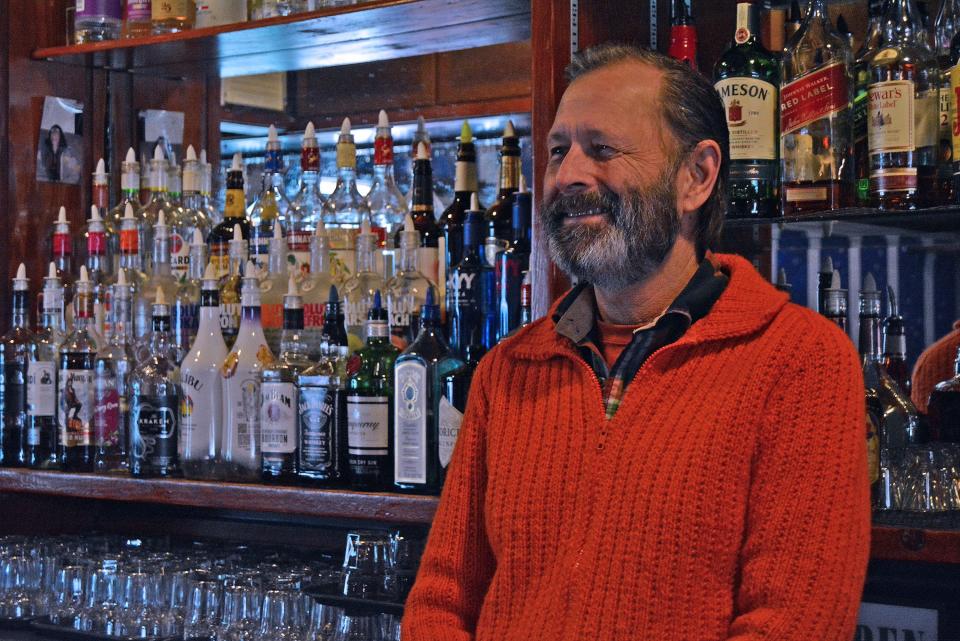How has Columbia LGBTQ acceptance changed in 40 years? Arch and Column regulars share stories

If you visit the Arch and Column Pub, Columbia's sole LGBTQ bar, affectionately known as Arches, on the Business Loop in the early evening hours on a Wednesday, and maybe even Friday or Saturday, you are sure to see a group of guys sitting around, chatting about their week and sometimes reminiscing.
These men have lived in Columbia for at least the last 30 to 40 years and have had a chance to observe the changing moods in Columbia's culture and its acceptance of the LGBTQ community. Among these regulars are those who were former owners of Columbia LGBTQ bars.
The group of regulars are somewhat the vestiges of what was known as the Rainbow Rotary. This was a group of men who would meet to have dinner on a regular basis and also hold a 50-50 raffle over the course of the evening in support of a local charity.
With the Mid-MO Pridefest coming up Sept. 23-24, the Tribune wanted to take down an oral history, however brief, about LGBTQ life in Columbia dating back upward of 40-50 years ahead of the festivities. 2023 is PrideFest's 19th year in Columbia at Rose Music Hall, this year occupying Park Avenue between South 10th Street and St. James Street with vendors along Park Avenue, Orr Street and St. James Street.
More on Columbia's LGBTQ history is available through documents at the State Historical Society of Missouri, mostly relating back to University of Missouri students, faculty and staff fighting for recognition and rights. This includes documents of Victor Estevez, an MU professor who pushed for nondiscrimination policies at the university and in the broader community. Estevez donated his collected documents in 1996 before his death two years later.
LGBTQ bar memories
One of the only ways 30-50 years ago an LGBTQ person could find community was through the nightlife of going out to bars.
In the late 1980s, LGBTQ-owned or friendly bars included Three Cheers at the Tiger Hotel, said Marshall Newman, who once was owner of SoCo Club.
SoCo club was located near Nifong Boulevard before moving downtown to South Seventh Street in the late 2000s to early 2010s. MyHouse nightclub and sports bar once was SoCo Club.
Three Cheers also was the name of a restaurant and bar on the Business Loop that eventually would become Arches, owned by Pitt Potter.
Newman came to Columbia having transferred to the University of Missouri from George Mason University.
"Back then it was little different with the gay world. You played it low key," he said.
The first LGBTQ bar Newman visited was Questions in the area of Eighth Street and Broadway. Questions would later open a secondary, second-floor bar called Answers.

"There was a few places that were gay friendly like The Blue Note, By George’s and Whispers. It had a dance floor like Saturday Night Fever," he said about Whispers. "It was next to Schnuck’s on Forum Boulevard."
Other bars mentioned by Arch and Column patrons included Zazoos, Styx and Contacts, the latter of which was owned and managed from the late 1980s to mid-1990s by Scott Miniea.
Zazoos, where its previous business name was Mike's Paradise Retreat, was a place you would see guys at the bar and gals at the pool tables, Miniea said.
Miniea opened Contacts in the 1987 to 1988 timeframe when he still was a junior at MU. After a brief closure it moved from its original location on the business loop to South Ninth Street in 1991, where Chipotle now is located. It would have its second and final move to Broadway, where Billiards on Broadway now is.
He left the business in 1993 to start his education career, but still helped manage it some. Newman also was employed at Contacts during this time as a door man, and sometimes bar tender.
"Contacts got really big. On a Saturday night there could be 500-600 people in that room. Eventually the competition was between Contacts and Styx," he said, adding that by the time Styx closed, and SoCo Club was now up and running, that Styx had welcomed some big names in drag such as Lady Chablis, Lady Bunny and well-known gay adult film performers.
The best LGBTQ bar model for Columbia was when there was a lounge-style place and one night club, Miniea said.
"Anytime there were two bars they would do fine. Then some would see a busy Saturday night and they’d open a bar and then all three would suffer," he said.
The importance of LGBTQ bars
The bars in Columbia were more than just a place you could get a drink, but they were community centers where you could discuss issues of the day, Miniea said. Arches still exists very much like a community center, he added.
"Back in the '80s and '90s you would get a lot of nervous calls with a shaking voice asking if our place was a gay bar," Miniea said about Contacts and relating other experiences back to Arches. "People will come here and talk about (legislation affecting the community). Whereas, even if you were normally going to go to some place like Flat Branch, you wouldn’t go there to talk about (that stuff). There is an identity here (at Arches)."
With legislation impacting so many and politicians wanting us to go back into the closet, it almost seems like we are needing a second Stonewall Uprising, said bar patron Darren Lammers.
"We thought things had gotten better but it's going full circle again," he said.
Newman and Miniea were very protective of their patrons because "the last thing we wanted was for someone to get outed or hurt," Newman said.
In the 1980s and 1990s, the thing to do was go to the bars, said one Arches patron, who asked to remain anonymous.

"There wasn’t social media. There wasn’t that way of meeting people, so you went to the bars. The bars were crowded," he said. "We noticed at SoCo as cellphones became more popular, people started meeting each other outside of a bar setting. That kind of was the start to deterioration of the gay bar that we know."
On the other hand, it also has allowed people to find Arches, said another anonymous patron.
"Now with all the technology, I found this place on Facebook searching gay bar," he said.
Another aspect about being in a relatively smaller community is that those within the varying facets of the LGBTQ community all come to Arches, said patron Kevin Clohessy. You would not find that in the bigger cities, he added.
"In larger cities, there are friends of ours who didn’t know any lesbians because those cities are so big and they have separate bars," Clohessy said. "We have profited from knowing some really incredible women."
The first bar Clohessy ever visited was the Tiger Hotel version of Three Cheers. It had an impact.
"I drove around that block and drove around that block. I probably used eight gallons of gas before I finally decided to stop and go in. I remember walking in and encountering a guy from my hometown. I was terrified," he said. "I probably had one drink and I left."
It would be years later when Clohessy and his friends were able to be more open and affirming for someone else, a waiter and student in education at Billiards on Broadway.
"He just seemed polite enough and we were comfortable enough in our lives to share that Billiards used to be a gay bar," he said. "So, here we were many years later eating at a place where we would have been afraid to go to, and now telling a much younger generation that we are six gay couples. It was such a neat experience to be that open and affirming to him. We hope he’s doing well with his career."
More: Former student leaders reflect on 1970s battle for Missouri to recognize gay student group
Arches is one of the few places in Columbia that is gay identified and straight friendly, said one of the two anonymous patrons.
"Most places are straight oriented but gay friendly. You go there because you can be comfortable, but you still have to be (aware of your surroundings)," he said.
Arches also is not hidden like LGBTQ bars once were, Clohessy said.
"Finding the gay bar was part of the whole mystique in cities," he said. "I was in Washington, D.C. before GPS and we drove into a warehouse district and there were all these tractor trailers and then you’d round a corner and you’d see a parking lot with all these cars. Then you’d find a nondescript door with a light above it and blacked out windows."
Miniea credited Potter with ensuring Arches continues to have a welcoming atmosphere over its 20-year and counting history.
"It’s kind of funny to say that Columbia has one gay bar, but it is the one gay bar that is the community center still," he said. "It’s not that other places aren’t safe, but it’s where you come and have someone like Pitt who has been in the community for 20 some-odd years now and has given so much back to the community."
From 2022: 'Be happy, be kind': Arch and Column Pub to mark 20-year anniversary serving LGBTQ community
NOTE: This article has been updated to reflect that Victor Estevez was a University of Missouri professor, not a student who pushed for policy changes at the university and in the broader community. He also did not die from AIDS-related complications, but his HIV/AIDS activism increased after the 1988 death of sociology student Carl Megl.
Charles Dunlap covers local government, community stories and other general subjects for the Tribune. You can reach him at cdunlap@columbiatribune.com or @CD_CDT on Twitter. Subscribe to support vital local journalism.
This article originally appeared on Columbia Daily Tribune: Columbia LGBTQ community goes from hidden to accepted over 40-plus years

